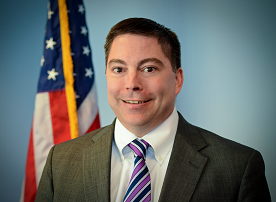NAB 2016: O'Rielly Slams FCC's 'Black Box' Proposal

Complete Coverage: NAB Show 2016
Republican FCC commissioner Michael O'Rielly took aim at the FCC's proposal to unlock cable set-top boxes, saying the FCC was redefining terms in an effort "to use government to artificially cheapen the value of video content."
In a speech at the National Association of Broadcasters convention in Las Vegas, O'Rielly said calling it a set-top box proposal was a misnomer and that it was actually all about the FCC "taking a 90s regime and redefining all of its terms to let the Commission get its hooks into all of the new technology that has developed since then, outside of the Commission’s authority."
Related: Pai Signals Rural Could Lead Repack
O'Rielly, who voted against the proposal, also took aim at the FCC's media campaign promoting the proposal, including its #unlockthebox hashtag.
O'Rielly was speaking before a panel session, "Unlocking Pandora’s Box? A Closer Look At What’s At Stake in the FCC’s Proposal to Open Up Pay TV’s Set Top Boxes." But he said he had his own metaphor for the proposal.
Related: President Obama Backs Wheeler's Set-Top Proposal, Big Time
Broadcasting & Cable Newsletter
The smarter way to stay on top of broadcasting and cable industry. Sign up below
He called it a black box, a giant question mark from the perspective of "broadcasters, MVPDs, and consumers alike."
Broadcasters are concerned, as are other programmers, about how their content could be repackaged and/or monetized on the third party devices that would be given access to MVPD programming streams.
Related: TPI Fellow Slams Set-Top Proposal
O'Rielly says they are right to be worried. "How will the billions and billions of dollars-worth of video content be protected from theft? Well, it turns out you don’t need to worry about that at all. Some other people are going to figure that out," said O'Rielly. "Which other people? No one quite knows."
"Maybe you’re concerned about what will happen to your advertising, or all of those deals on channel placement you have taken great pains to hammer out with MVPDs," he told his panel audience. "Under the proposed item, the MVPD has to pass through a 'flow' of all of its content to any third party who can write an app and sync up with the imaginary security system I just mentioned, which is a third party you, the broadcaster, have no contractual relationship with. What is to stop such a third party from reorganizing the channel lineup, framing your video with its own ads, or even just overwriting your ads in real time with its own?"
Related: FCC Will Pay for Covered Pre-Auction Expenses
O'Rielly says the proposal will ultimately devalue all content, adding, "no one knows more than broadcasters that video production and distribution are both very expensive businesses to be in."
Contributing editor John Eggerton has been an editor and/or writer on media regulation, legislation and policy for over four decades, including covering the FCC, FTC, Congress, the major media trade associations, and the federal courts. In addition to Multichannel News and Broadcasting + Cable, his work has appeared in Radio World, TV Technology, TV Fax, This Week in Consumer Electronics, Variety and the Encyclopedia Britannica.

